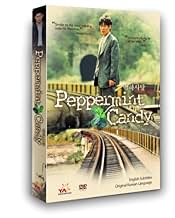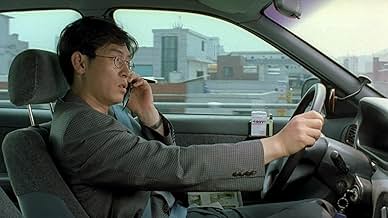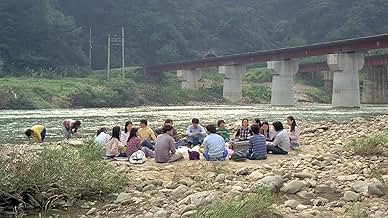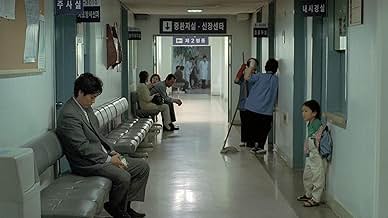Bakhasatang
- 1999
- 2 घं 9 मि
IMDb रेटिंग
7.6/10
12 हज़ार
आपकी रेटिंग
इसमें एक आदमी के जीवन के उन पांच चरणों को शामिल किया गया है, जो अंत में उसकी आत्महत्या का कारण बनते हैं.इसमें एक आदमी के जीवन के उन पांच चरणों को शामिल किया गया है, जो अंत में उसकी आत्महत्या का कारण बनते हैं.इसमें एक आदमी के जीवन के उन पांच चरणों को शामिल किया गया है, जो अंत में उसकी आत्महत्या का कारण बनते हैं.
- पुरस्कार
- 18 जीत और कुल 6 नामांकन
Ko Seo-hie
- Kyung-ah
- (as Seo-hie Ko)
Park Ji-yeon
- Female student
- (as Ji-Yeon Park)
Kim Kyeong-ik
- Myung-sik
- (as Kim Gyeong-ik)
Jeong Woo-hyeok
- Corporal Park
- (as Woo-hyeok Jeong)
Bae Jang-soo
- Camera shop owner
- (as Jang-soo Bae)
फ़ीचर्ड समीक्षाएं
At the beginning and at the end of the film I did not like his character and his horrible nature. but a good story. at the beginning of the storyline presented by people who are very depressed and suicidal, we will be presented with a flow of flasback back to the steps of the past, step by step from various character changes and behavioral conditions experienced.
I was curious that I read on the internet this film raised the issue of tragic events in 1980 (Gwangju Murder) through individual figures. Through this film, the director seems to want to illustrate the dramatic effect of the cruel event, the victims were not only civilians, but also "perpetrators", soldiers who had just carried out orders.
we can be prejudiced about this film but we can reflect on life that someone's future that might be destroyed can also be formed by a dark past.
I saw this movie in a college class, and it's possible to have an entire lecture on it. Unfortunately, my professor only had about twenty minutes, though I'm sure he would've loved a couple hours.
Granted, the subtitles weren't the greatest. Being Korean, I had a much easier time understanding everything, because if there was something I couldn't quite understand in Korean, I had the subtitles to help me along.
To paraphrase my professor, this movie isn't just about the story of one man, but how this one man's life signifies the past fifty years of Korean history as well, a people subject to the influences of forces greater than they.
To give a quick Korean history lesson, for the first half of the century, the Koreans were brutally subjugated by the Japanese, who not only wanted to colonize it, but to assimilate the people and culture completely into their own. Then came WW2, and following that, the start of the Cold War conflicts, beginning of course with the Korean War, where brother fought brother and a people was torn apart.
The second half of the century, following the Korean War, has been defined by dictatorships, as the oppressive Korean government put down democratic student movements, as seen in part of the film. It is only recently that true democracy has begun to form and strengthen.
The main character of the movie is shown in the beginning, a ruined man, and one can assume from following sequences, shown in backwards chronological order, that he is an evil and corrupt man. However, the purpose of the movie is to show how he was corrupted by larger forces, mirroring the Korean people's own search for their lost innocence. It is in the seemingly mundane scenes of his life that we see how trite and ordinary violence and depravity have become, yet we also travel back to see where every part of him came from.
I'm sure I could say a lot more, but basically it's about a lot more than the story of one man, and the seemingly irrelevant stories of his life signify more about both him and the Korean people as a whole. Terrific movie.
Granted, the subtitles weren't the greatest. Being Korean, I had a much easier time understanding everything, because if there was something I couldn't quite understand in Korean, I had the subtitles to help me along.
To paraphrase my professor, this movie isn't just about the story of one man, but how this one man's life signifies the past fifty years of Korean history as well, a people subject to the influences of forces greater than they.
To give a quick Korean history lesson, for the first half of the century, the Koreans were brutally subjugated by the Japanese, who not only wanted to colonize it, but to assimilate the people and culture completely into their own. Then came WW2, and following that, the start of the Cold War conflicts, beginning of course with the Korean War, where brother fought brother and a people was torn apart.
The second half of the century, following the Korean War, has been defined by dictatorships, as the oppressive Korean government put down democratic student movements, as seen in part of the film. It is only recently that true democracy has begun to form and strengthen.
The main character of the movie is shown in the beginning, a ruined man, and one can assume from following sequences, shown in backwards chronological order, that he is an evil and corrupt man. However, the purpose of the movie is to show how he was corrupted by larger forces, mirroring the Korean people's own search for their lost innocence. It is in the seemingly mundane scenes of his life that we see how trite and ordinary violence and depravity have become, yet we also travel back to see where every part of him came from.
I'm sure I could say a lot more, but basically it's about a lot more than the story of one man, and the seemingly irrelevant stories of his life signify more about both him and the Korean people as a whole. Terrific movie.
A smart film! We get to follow a man back in time (in the "wrong" chronological order!?). At first he seems to be a cruel, evil and bitter man. But the further back in time the film takes us we get another picture. A picture of how an ordinary nice guy turns in to a sadistic man by the "system". Maybe the film makers wants us to see that no man is born evil.
"Peppermint Candy" was really a nice surprise of a movie. Initially it started out a little bit strange and slow, but the story quickly kicked in and got under my skin. And once that happened, the movie just swept me away.
The movie starts out where we see a very trouble man at a reunion of sorts and he ends up committing suicide at an oncoming train. Then the story leads us back in time, lettings us travel to crucial points in the man's past, seeing what caused the man's current state of mind at the suicide point. So this was a reverse travel, seeing how the man's psyche changed gradually.
I must say that "Peppermint Candy" was really a beautiful movie, and it was a real visual treat to watch. Especially the train scenes, watching the train drive on the track, but it was filmed in reverse (just pay attention to the surroundings around the tracks, and you will see), and that was a major important factor to the movie, as it was metaphorical for taking us further back in time, to another milestone in the main character's history.
"Peppermint Candy" is a strong story-driven movie, but it is also driven by some amazing acting performances. The actors and actresses really did great jobs with their given roles, and they made the movie really come to life on the screen. Especially Kyung-gu Sol (playing Yong-ho) did an amazing job with his acting, just as what he did in the 2002 movie "Oasis". He is phenomenal at this kind of serious acting.
This is another great movie from Third Window Films, and they do deal in movies that are not mainstream Hollywood types of movies. So these movies might not be suitable for the average audience, but appeals to a more sophisticated and mature audience, who want more than just mindless entertainment, but prefer something with depth and meaning, something to challenge us and make us think. And "Peppermint Candy" is just that kind of movie.
If you like Korean movies, and like movies that are heavy on the story-driven aspect, then delve into "Peppermint Candy", because it is really a breathtakingly beautiful movie, and the story is so well told that it will stick with you for a while. And the reverse chronological order in which the story is told was just a touch of genius.
The movie starts out where we see a very trouble man at a reunion of sorts and he ends up committing suicide at an oncoming train. Then the story leads us back in time, lettings us travel to crucial points in the man's past, seeing what caused the man's current state of mind at the suicide point. So this was a reverse travel, seeing how the man's psyche changed gradually.
I must say that "Peppermint Candy" was really a beautiful movie, and it was a real visual treat to watch. Especially the train scenes, watching the train drive on the track, but it was filmed in reverse (just pay attention to the surroundings around the tracks, and you will see), and that was a major important factor to the movie, as it was metaphorical for taking us further back in time, to another milestone in the main character's history.
"Peppermint Candy" is a strong story-driven movie, but it is also driven by some amazing acting performances. The actors and actresses really did great jobs with their given roles, and they made the movie really come to life on the screen. Especially Kyung-gu Sol (playing Yong-ho) did an amazing job with his acting, just as what he did in the 2002 movie "Oasis". He is phenomenal at this kind of serious acting.
This is another great movie from Third Window Films, and they do deal in movies that are not mainstream Hollywood types of movies. So these movies might not be suitable for the average audience, but appeals to a more sophisticated and mature audience, who want more than just mindless entertainment, but prefer something with depth and meaning, something to challenge us and make us think. And "Peppermint Candy" is just that kind of movie.
If you like Korean movies, and like movies that are heavy on the story-driven aspect, then delve into "Peppermint Candy", because it is really a breathtakingly beautiful movie, and the story is so well told that it will stick with you for a while. And the reverse chronological order in which the story is told was just a touch of genius.
Lee Chang-dong's second feature film is a lot more ambitious than his debut Green Fish. It presents a story unfolding in reverse chronology spanning several years before a man's suicide. The narrative is split between different parts with time gaps in between, connected by the movement of a train going back in time.
This film has some really great moments in it, but as a collective piece, it doesn't work as well as I wanted it to. I keep coming back to it hoping I find some new meaning to it, but my original opinion still hasn't changed. So let me go through everything that I didn't like about this movie, and then I'll move onto what I did like about it.
First off, I find the intro really annoying. It mostly has to do with the main character's obnoxious acting, but the silly characters surrounding him don't help much either. I don't claim to know anything about suicide, but I personally found it to be way over the top, especially coming from a director like Lee Chang-dong, who usually directs his films with incredible nuance and subtlety.
Throughout the whole movie I was asking "what is wrong with this guy" and clearly director Lee wanted me to be asking that so that the reveal at the end resonates with me emotionally. Unfortunately it didn't. I still sit there confused during rewatches, watching a lot of these scenes. It seems a little reductive to have a person's life be explained/justified by a single moment.
And my final big complaint is that there are no well written characters surrounding the protagonist. The big time skips between the segments make certain characters seem unrecognisable, and as a result they feel shallow, only used as narrative tools to hit certain plot points or references necessary for the main character's development.
On the bright side however, I really enjoyed certain parts of the story. Especially "Life is Beautiful" I thought was really well done, and managed to capture the complex emotions that Young-ho was feeling perfectly. The scene in the car driving back home is probably my favourite moment in the whole film. It says so much while doing so little.
Also I thought the callbacks were pretty well done throughout the film. That way the film maintains a through line that keeps the parts connected, and prevents the story from feeling too disjointed. The execution of the references isn't always the best, but it's at least serviceable, and it makes you remember important moments in the film.
In general I'm very conflicted about this film. I wanted to like it a lot more than I did, because there are some really interesting moments in this story. But in the end, it didn't impact me as much as Lee's other films did. But it's still a good movie, and I still enjoyed it, despite all of my problems with it.
This film has some really great moments in it, but as a collective piece, it doesn't work as well as I wanted it to. I keep coming back to it hoping I find some new meaning to it, but my original opinion still hasn't changed. So let me go through everything that I didn't like about this movie, and then I'll move onto what I did like about it.
First off, I find the intro really annoying. It mostly has to do with the main character's obnoxious acting, but the silly characters surrounding him don't help much either. I don't claim to know anything about suicide, but I personally found it to be way over the top, especially coming from a director like Lee Chang-dong, who usually directs his films with incredible nuance and subtlety.
Throughout the whole movie I was asking "what is wrong with this guy" and clearly director Lee wanted me to be asking that so that the reveal at the end resonates with me emotionally. Unfortunately it didn't. I still sit there confused during rewatches, watching a lot of these scenes. It seems a little reductive to have a person's life be explained/justified by a single moment.
And my final big complaint is that there are no well written characters surrounding the protagonist. The big time skips between the segments make certain characters seem unrecognisable, and as a result they feel shallow, only used as narrative tools to hit certain plot points or references necessary for the main character's development.
On the bright side however, I really enjoyed certain parts of the story. Especially "Life is Beautiful" I thought was really well done, and managed to capture the complex emotions that Young-ho was feeling perfectly. The scene in the car driving back home is probably my favourite moment in the whole film. It says so much while doing so little.
Also I thought the callbacks were pretty well done throughout the film. That way the film maintains a through line that keeps the parts connected, and prevents the story from feeling too disjointed. The execution of the references isn't always the best, but it's at least serviceable, and it makes you remember important moments in the film.
In general I'm very conflicted about this film. I wanted to like it a lot more than I did, because there are some really interesting moments in this story. But in the end, it didn't impact me as much as Lee's other films did. But it's still a good movie, and I still enjoyed it, despite all of my problems with it.
क्या आपको पता है
- ट्रिवियाSeo-hie Ko's debut.
- कनेक्शनReferenced in Making Memories of Murder (2004)
- साउंडट्रैकCatch the Rainbow
Written & Performed by Ritchie Blackmore and Ronnie James Dio
(Blackmore and Dio are member of Rainbow)
टॉप पसंद
रेटिंग देने के लिए साइन-इन करें और वैयक्तिकृत सुझावों के लिए वॉचलिस्ट करें
- How long is Peppermint Candy?Alexa द्वारा संचालित
विवरण
- रिलीज़ की तारीख़
- कंट्री ऑफ़ ओरिजिन
- आधिकारिक साइट
- भाषा
- इस रूप में भी जाना जाता है
- Peppermint Candy
- उत्पादन कंपनियां
- IMDbPro पर और कंपनी क्रेडिट देखें
बॉक्स ऑफ़िस
- दुनिया भर में सकल
- $89,184
इस पेज में योगदान दें
किसी बदलाव का सुझाव दें या अनुपलब्ध कॉन्टेंट जोड़ें




























